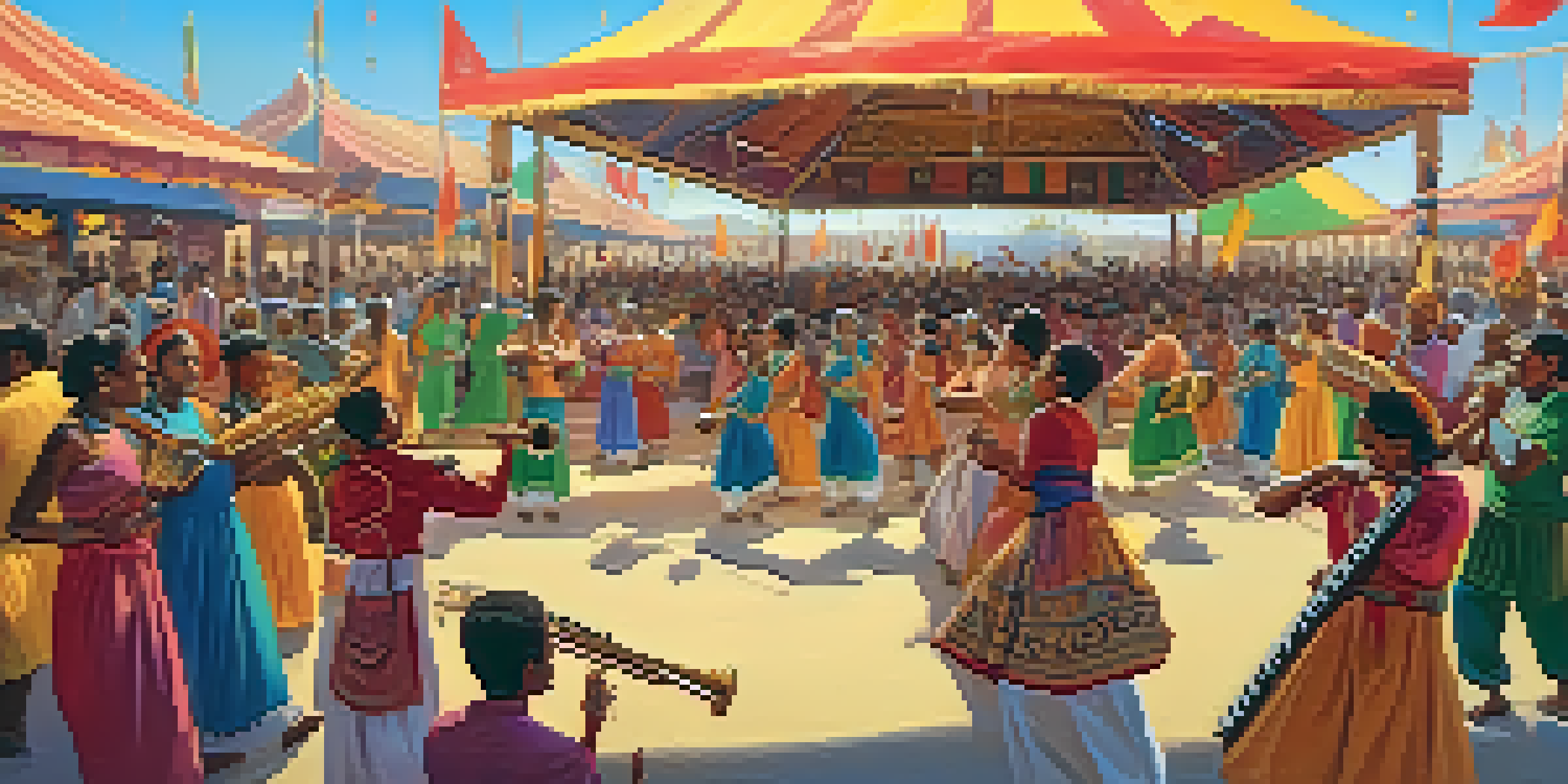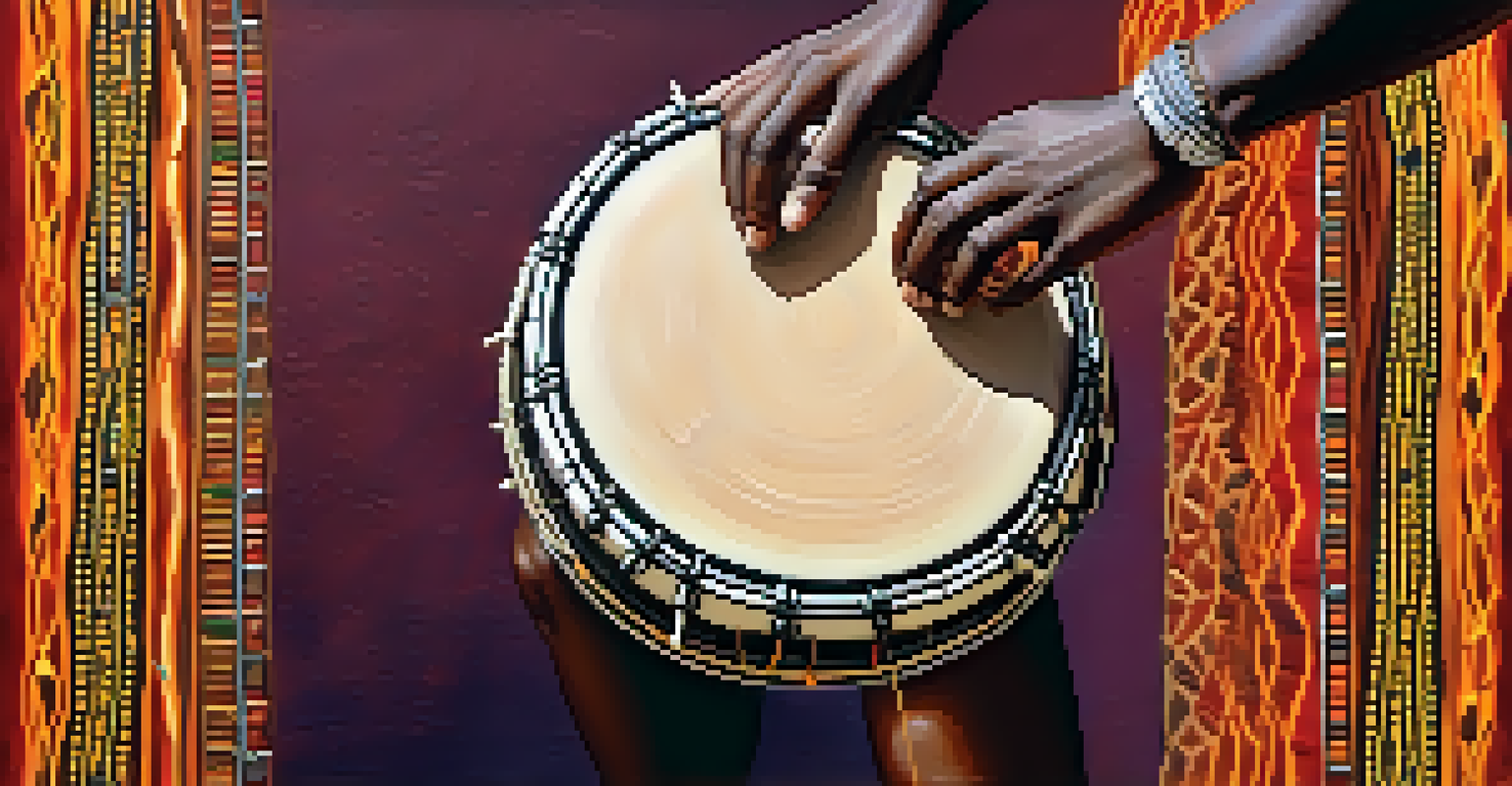Cultural Variations in Music and Time Perception

Understanding Time Perception Across Cultures
Time perception can vary significantly from one culture to another. In some cultures, time is viewed as linear, where events happen in a sequential order. However, other cultures may see time as cyclical, emphasizing the repetition of seasons and events, which can influence daily life and music creation.
Time is what we want most, but what we use worst.
For instance, in Western societies, punctuality is often valued, leading to a structured perception of time. In contrast, many Indigenous cultures may prioritize relationships and experiences over strict adherence to the clock, which can affect their musical traditions, often resulting in improvisation and spontaneity.
These differences not only shape how music is created and performed but also how it is experienced. Understanding these variations in time perception can deepen our appreciation of the diverse musical expressions around the globe.
The Role of Rhythm in Music and Time
Rhythm is a crucial element of music that can reflect cultural attitudes towards time. In cultures with a strong sense of punctuality, music often features strict, predictable rhythms. For example, classical Western music frequently adheres to a metrical structure, which aligns with the linear view of time.

Conversely, in cultures where time is perceived more fluidly, rhythms may be more flexible and syncopated. African drumming traditions, for instance, often involve complex polyrhythms that can shift unexpectedly, mirroring the cyclical nature of time in those cultures.
Cultural Time Perception Shapes Music
Different cultures perceive time in unique ways, influencing their musical traditions and expressions.
This interplay between rhythm and time perception highlights how cultural values can shape musical forms. By exploring these rhythms, we can gain insights into the cultural contexts from which they emerge.
Cultural Influence on Melody and Time Experience
Melody, like rhythm, is influenced by cultural perceptions of time. In cultures where time is seen as a series of moments to be cherished, melodies may be more lyrical and expressive. For example, the folk music of many cultures tends to emphasize storytelling through melodies that flow naturally.
Music is the shorthand of emotion.
On the other hand, in cultures that prioritize efficiency and productivity, melodies may be more straightforward and functional. This can be seen in certain pop music genres that focus on catchy hooks designed to capture attention quickly, reflecting a more immediate experience of time.
By examining how melodies are constructed and appreciated across cultures, we can better understand the relationship between musical expression and temporal perception.
The Impact of Technology on Music and Time Perception
Technological advancements have transformed how we create and perceive music, affecting cultural attitudes towards time. With the rise of digital music production, artists can manipulate time in ways that were previously impossible. For instance, looping techniques allow musicians to create layered sounds that challenge traditional notions of time.
Moreover, technology has enabled instant access to music from around the world, blending various cultural influences. This fusion can lead to new genres that reflect a more globalized view of time and music, where the linear and cyclical perceptions coexist.
Rhythm Reflects Cultural Values
The structure of rhythm in music often mirrors cultural attitudes toward time, with strict rhythms for punctual cultures and fluid rhythms for more cyclical ones.
As technology continues to evolve, so too will our understanding of music and its relationship with time. Embracing these changes can enrich our musical experiences and cultural appreciation.
Cultural Events and Their Musical Expressions
Cultural events often showcase unique musical expressions that reflect a community's perception of time. Festivals, rituals, and ceremonies frequently feature music that aligns with specific temporal beliefs. For example, the rhythmic chants and dances during a harvest festival may embody a cyclical view of time, celebrating the seasons.
In contrast, events like weddings in Western cultures may emphasize a linear progression, with music marking specific moments in the ceremony. These musical choices not only enhance the experience but also reinforce cultural values surrounding time and its significance.
By examining the music associated with various cultural events, we can gain insights into how time perception shapes communal identity and expression.
Music Therapy and Time Perception Across Cultures
Music therapy has emerged as a powerful tool for healing, with its effectiveness influenced by cultural perceptions of time. In cultures where time is seen as a continuum, music therapy may focus on building connections and fostering a sense of belonging. This approach can be particularly beneficial for individuals experiencing trauma or isolation.
Conversely, in more structured cultures, therapy may be more goal-oriented, with specific time frames for sessions and measurable outcomes. This difference in approach can affect the therapeutic relationship and the overall experience of healing through music.
Technology Transforming Music Experience
Advancements in technology are reshaping how music is created and perceived, leading to new genres that blend various cultural influences on time.
Understanding these cultural nuances in music therapy can improve its application and effectiveness, tailoring it to meet the needs of diverse populations.
Future Directions in Music and Time Research
As our world becomes increasingly interconnected, research on music and time perception will continue to evolve. Future studies could explore how globalization affects traditional music forms and their relationship with time. This could lead to new musical genres that blend various cultural perspectives on time.
Additionally, interdisciplinary approaches involving psychology, anthropology, and musicology can provide deeper insights into how different cultures experience time through music. By bringing together diverse fields, we can enrich our understanding of this complex relationship.

Ultimately, continued exploration of cultural variations in music and time perception will enhance our appreciation of the rich tapestry of global musical traditions.